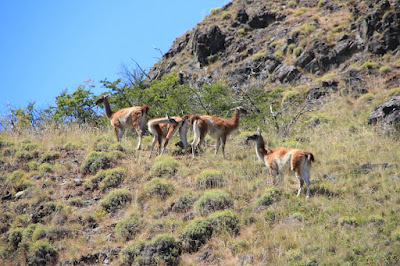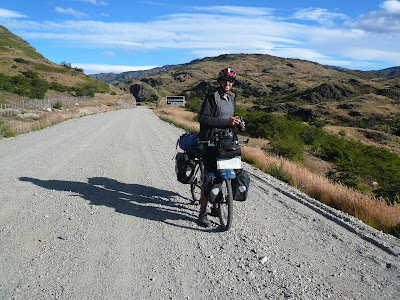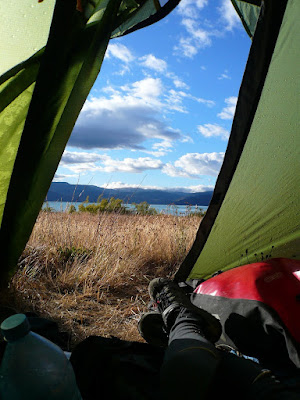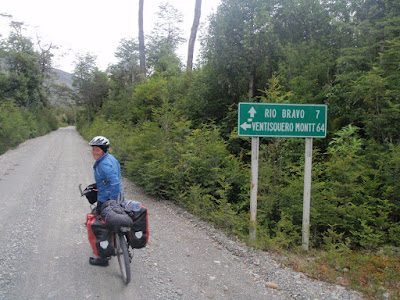It has been a while since our last post as there is not many people at the end of the world and even less reliable internet (even this one has been on and off all day).
We left the hostal in Villa O Higgins with meagre supplies of pasta and sauce, stale bread, no eggs and no veges as the monthly truck that restocks the towns minimercardos with things like fruit and veges was not due for two days (it nearly ran us over at the top of one of the first passes).
We were pleased to find the gravel road in quite good condition, partly because the ferry that connected it to the rest of Chile could only take 6 cars at a time, three times a day. This meant we could predict when the cars were going to pass us which was nice. The first day we saw more cyclists than cars.
 Good "ripio" (gravel road) with mountains to one side with the occasional waterfall and alpine swamp to the other
Good "ripio" (gravel road) with mountains to one side with the occasional waterfall and alpine swamp to the other
 Can you see us? We could have used my tent to match the poles but chose to match the grass instead. The road is on the left, no cars passed all night.
Can you see us? We could have used my tent to match the poles but chose to match the grass instead. The road is on the left, no cars passed all night.
 The waiting room at the ferry which we became well aquainted with. The cyclists going the other way had already wheeled their way inside, which was much easier than pitching the tent.
The waiting room at the ferry which we became well aquainted with. The cyclists going the other way had already wheeled their way inside, which was much easier than pitching the tent.
We left the hostal in Villa O Higgins with meagre supplies of pasta and sauce, stale bread, no eggs and no veges as the monthly truck that restocks the towns minimercardos with things like fruit and veges was not due for two days (it nearly ran us over at the top of one of the first passes).
We were pleased to find the gravel road in quite good condition, partly because the ferry that connected it to the rest of Chile could only take 6 cars at a time, three times a day. This meant we could predict when the cars were going to pass us which was nice. The first day we saw more cyclists than cars.
There was pretty stunning views along the road when the clouds were not getting in the way. We cycled 100km without passing any houses or farms really at all, just wilderness. After descending the first pass at the end of the day we were faced with a choice of finding a place to camp, or climb again on what looked like a steep sided hill with nowhere to stop should we have to give up half way up (which was not out of the question). We opted to occupy the little poled house with no walls that was painted orange as if to say "camp here". We accidently fell over a locked gate with all our bags to get in, but as the five cars from the ferry had already driven by there was no chance of being told off. The ginger tabby cat that came and saw us while we were making dinner did make us wonder if we were in someones front yard but we were happy to be out of the rain so tried not to think about it too much. Good "ripio" (gravel road) with mountains to one side with the occasional waterfall and alpine swamp to the other
Good "ripio" (gravel road) with mountains to one side with the occasional waterfall and alpine swamp to the other  Can you see us? We could have used my tent to match the poles but chose to match the grass instead. The road is on the left, no cars passed all night.
Can you see us? We could have used my tent to match the poles but chose to match the grass instead. The road is on the left, no cars passed all night. The waiting room at the ferry which we became well aquainted with. The cyclists going the other way had already wheeled their way inside, which was much easier than pitching the tent.
The waiting room at the ferry which we became well aquainted with. The cyclists going the other way had already wheeled their way inside, which was much easier than pitching the tent.The climb from the campsite was smaller than expected but the headwind slowed our progress to the ferry accross the fiord. Our hostel owner in O'Higgins had told us that the ferry sailed at 11am, 3pm and 7pm so we ambled along aiming for the 3pm sailing. As it turned out his info was way wrong and the 3pm ferry was actually at 1pm, so we were well and truly late when we rolled in at 2pm. The 6 hour wait for the 7pm ferry truly mucked up our plans of making it to the next town by nightfall, but provided the perfect opportunity for humorous holiday snaps in the local foliage. Luckily as we were walking off the boat in Puerto Yungay one of the boat workers said he had a cabin that he was renovating up the hill and for a small donation we could stay there. If we wanted a fire we should chop some wood (Ben loves chopping wood at the end of a hard days cycling). A cabin was a much better option than a tent site on a rainy beach, so we took it.
The next day we climbed to the top of the next (and much bigger) pass in the showers and decended into heavy rain on the other side. The supply truck had passed through Tortel on the way to O'Higgins, so we opted to take the 40km detour to refresh supplies and see this village that is famous for having timber boardwalks instead of roads. The directions from our O'Higgins host here were also way off: he told us to take the road towards the airport and get a water taxi to a hospedaje (bed and breakfast) in the old part of town. We took the road (downhill), found the airport and where the boats should have been but when we asked where the boats were the lady looked at us like we were stupid and said "no, you go back the way you came and take the road, that's what is its for, stupid cyclists.." So now taking the road back up the hill, in the rain, we arrived very wet and could not face walking out bikes along the boardwalks and up all the stairs, so we got the closest hospedaje to the carpark. We ate our first local meal there, a "lomo a la pobre", which is steak and chips with two eggs and fried onions. We think anything "a la pobre" is good news.
Tortel turned out to be quite a nice place in the morning when it stopped raining. We had a nice walk around while waiting for the small grocery store to open. The store had home made bread but clearly something had gone askew as it was very, very dense.
 |
| Tortel again. Cypress boardwalks are everywhere. |
 |
| The stairs we couldn't be bothered with the night before, but great views. |
We left Tortel the next morning in the hope that the fine break in the weather would hold until we were behind the Northern Ice Field (Campo de Heilo Norte). The road slowed our progress as it was big loose gravel mixed with corrugations. Late in the afternoon our friend Pavel caught us up as he had been chasing us "like a puma" having caught the later ferry on the epic border crossing. We made camp by the river after deciding not to stay at a campground which offered us a stony paddock and a cold shower for the price equivalent of two steak dinners each. After all we could wash in the cold river just down the road for free.
The next day was a big one to the first 'town' on this road, Cochrane. This town is the second largest on this 1200km stretch of road, but has only 2000 people so not large at all. After stopping to talk to all 20 cyclists we passed during the day we finally made it. A room at the hospedaje was arranged for a two night stay and a rest before the next uninhabited stretch of road was attempted. It was exciting to find that this place had a bakery and we could do some washing, and surf the internet. It even had sealed roads.
Deciding to get some fresh bread and collect our washing before leaving town was a bit of a mistake as it was a Sunday so everything was a bit slow to start. By the time we had collected our clothes, waited for the bread to come out of the oven and changed into our cycling gear it was already 11am.
On our ride out of town we saw some more cyclists and decided to say hello (as you do here). There was a nice Australian couple who had some good tips for us, but after a gathering of up to 8 cyclists on the side of the road we finally left 3 hours later. We headed out on what they had described as their hardest days ride on the whole road. Two of them took great joy in describing injuries and pulled muscles from the 4 hills that we had ahead of us. Not 5km out of town we met some more Aussies who had biked from Alaska and had another chat, swapping route and road information. Now nearly dinner time and we had only biked for about 20 minutes. We had some serious ground to make up, but the weather was warm and cycling along next to the beautiful Rio Baker we made Puerto Bertrand at sunset. We camped for free right in the middle of the village next to the lake amongst some apple trees.
 |
| Guanacos on the way out of Cochrane. |
 |
| Ben on the way to the Rio Baker |
After picking up more freshly baked bread (not as dense as Tortel) the next morning we started riding around Lago General Carrerra, the largest lake down here. We were aiming for a hamlet called Rio Tranquilo which turned out to be not so tranquil.
 |
| Bridge. |
 |
| Anna expertly colour coordinated with the bridge. |
We made slow progress over a hilly road in the morning, talking to cyclists from Chile, Holland, France, Slovenia and Germany before stopping for coffee at a small place next to an impressive bridge. We carried on around the valley and with the wind getting up and rain beginning to fall found a sheltered campsite in a field next to the lake. We were joined by Pavel and another cyclist later in the evening and treated to sun and no wind when we woke up the next morning. We ate our breakfast on the beach.
 |
| A room with a view. |
The 20kms left to Tranquilio the next morning turned out to be a giant hill, 10kms up and 10kms down. The moment we got there it became very windy and stormy which was bad news as we wanted to take a boat trip to the marble caves that are famous here. The boat operator suggested first thing tomorrowu morning so we booked into a cheap hospedaje and hunkered down for the night. The next morning was just as stormy but we went out on the boat anyway. The caves were very nice but with a 1m swell the ride back in the boat was a bit bumpy and wet.
 |
| Ben on the boat at the marble caves |
 |
| Marble cave. |
 |
| etc. |











Ahh so you are there Ben. I was looking through the photos and couldn't see you. At first I thought it must have been because you were taking the photos but now I see it must have been that you appear to have left your shaver here in NZ haha.
ReplyDeleteIts looking darn cool there.